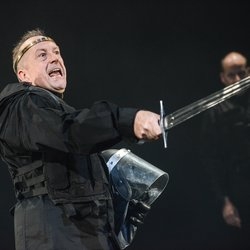Richard III (York)
York’s city wide festival continues with Shakespeare’s ”Richard III” at the Theatre Royal
A question that always puzzles me is, “Did Shakespeare’s original audiences find his confiding villains, notably Iago and Richard III, funny?” It’s difficult to imagine that their bluntly truthful asides contrasted with the hypocrisy of their public utterances didn’t raise a laugh among the groundlings. However, performances that foreground humour are undoubtedly increasing in an age when irony is firmly in fashion.

© Robert Day
Ian Bartholomew‘s Richard in Loveday Ingram‘s production, originally staged at Nottingham Playhouse, is certainly funny. His opening “Now is the winter of our discontent” speech sets the tone for the performance, every word of praise fraught with irony – spoken, as it were, in quotation marks.
His asides, grimaces and precision of diction chart the comical and tragic progress of his unlikely rise, the menace and evil undiluted by the laughs. In an older Richard than usual, I missed the devilish energy, but it is still a fine central performance.
It takes time for the rest of the production to cohere around him, but cohere it certainly does. The impact of the earlier scenes of court conspiracy is lessened by a rather anonymous and unimaginatively directed set of nobles.
The dark business suits don’t help, nor does the misfortune that forces Charles Daish to play Clarence on crutches (a noble effort, but some loss of flexibility is inevitable), but, whatever the reason, these scenes are less than involving and even actors as capable as Paul Greenwood (Hastings) and Paul Slack (Stanley) are slow to make their mark. Milo Twomey has a nicely wry sense of mischief, but doesn’t always convince as “princely Buckingham”.
The prayer book scene, when a “reluctant” Richard is persuaded to leave his devotions and take the throne by a deluded crowd of Londoners, is beautifully played by Bartholomew and Twomey and creatively directed across the auditorium – and thereafter the production hits all its targets. Siobhan McCarthy (the Queen) and Joan Moon (Duchess of York) are both outstanding as they lament and curse with venom and raw power.
The alternative to Richard, Henry of Richmond, is given a nobly assertive reading by Nyasha Hatendi that left me eager to see what he could do with Henry V. And, with the aid of Simon Higlett‘s imaginative and flexible set, dramatic lighting (Mark Jonathan) and sound (Drew Baumohl), William Simpson‘s eerie projections, and atmospheric underscoring and the occasional flash of ceremonial from Steven Edis‘ music, all the key scenes in the second half are tellingly effective.
Any modern-dress Shakespearean tragedy or history will have some trouble with the battle scene, but Loveday Ingram comfortably gets away with it by surrounding it with a perfectly judged night before the battle and a splendidly effective death of the King.
Richard III continues at Theatre Royal, York until Saturday 30 November.
– Ron Simpson












